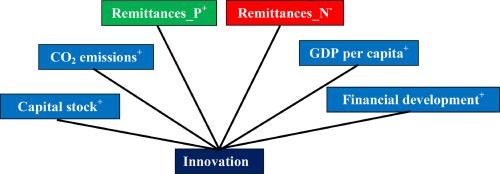The asymmetric impacts of remittances on innovation in middle-income economies: A nonlinear autoregressive distributed lag approach
IF 15.5
1区 管理学
Q1 BUSINESS
引用次数: 0
Abstract
Innovation is essential for promoting long-term growth in middle-income countries (MICs). Amid growing remittance inflows, understanding how these financial transfers influence innovation outcomes has become increasingly important; however, the prevailing literature overlooks the impact of remittances on innovation, mainly their asymmetrical effect. To address this gap, we employ the nonlinear autoregressive distributed lag approach and the Dumitrescu–Hurlin causality test. Specifically, we investigate the asymmetric effects of positive and negative remittance shocks on innovation in MICs over the short and long run, using panel data from 1996 to 2022. The study employs second-generation panel unit root tests to verify stationarity and second-generation cointegration analysis, confirming a stable long-term relationship among variables. Our findings indicate that positive remittance shocks stimulate innovation, while negative shocks have a detrimental impact. We also explore the significant positive association between innovation and key economic factors, including gross domestic product (GDP) per capita, CO2 emissions, financial development, and capital stock. These results can help policymakers design targeted policies that boost the economic benefits of remittance flows by aligning them with innovation-driven growth initiatives.

中等收入经济体中汇款对创新的不对称影响:一种非线性自回归分布滞后方法
创新对于促进中等收入国家的长期增长至关重要。在汇款流入不断增长的背景下,了解这些金融转移如何影响创新成果变得越来越重要;然而,主流文献忽视了汇款对创新的影响,主要是它们的不对称效应。为了解决这一差距,我们采用了非线性自回归分布滞后方法和dumitrescui - hurlin因果检验。具体而言,我们使用1996年至2022年的面板数据,研究了积极和消极汇款冲击对中等收入国家短期和长期创新的不对称影响。本研究采用第二代面板单位根检验检验平稳性,并采用第二代协整分析,确认变量之间存在稳定的长期关系。我们的研究结果表明,积极的汇款冲击会刺激创新,而消极冲击则会产生不利影响。我们还探讨了创新与关键经济因素(包括人均国内生产总值、二氧化碳排放、金融发展和资本存量)之间的显著正相关关系。这些结果可以帮助决策者制定有针对性的政策,通过使这些政策与创新驱动的增长举措相结合,提高汇款流动的经济效益。
本文章由计算机程序翻译,如有差异,请以英文原文为准。
求助全文
约1分钟内获得全文
求助全文
来源期刊

Journal of Innovation & Knowledge
Multiple-
CiteScore
16.10
自引率
12.70%
发文量
118
审稿时长
37 days
期刊介绍:
The Journal of Innovation and Knowledge (JIK) explores how innovation drives knowledge creation and vice versa, emphasizing that not all innovation leads to knowledge, but enduring innovation across diverse fields fosters theory and knowledge. JIK invites papers on innovations enhancing or generating knowledge, covering innovation processes, structures, outcomes, and behaviors at various levels. Articles in JIK examine knowledge-related changes promoting innovation for societal best practices.
JIK serves as a platform for high-quality studies undergoing double-blind peer review, ensuring global dissemination to scholars, practitioners, and policymakers who recognize innovation and knowledge as economic drivers. It publishes theoretical articles, empirical studies, case studies, reviews, and other content, addressing current trends and emerging topics in innovation and knowledge. The journal welcomes suggestions for special issues and encourages articles to showcase contextual differences and lessons for a broad audience.
In essence, JIK is an interdisciplinary journal dedicated to advancing theoretical and practical innovations and knowledge across multiple fields, including Economics, Business and Management, Engineering, Science, and Education.
 求助内容:
求助内容: 应助结果提醒方式:
应助结果提醒方式:


